How To Break Through As A Leader - 35 Years Of Lessons Learned With Scott McGohan
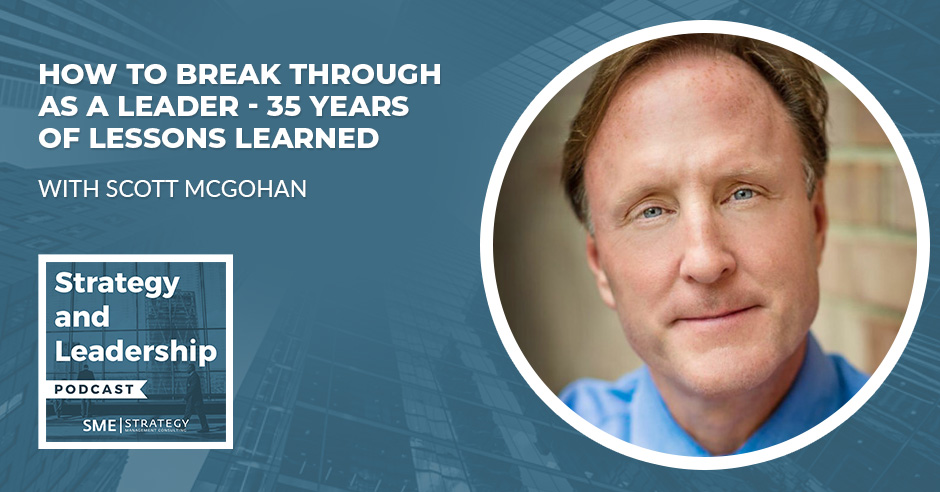
You can't lead people further than how you lead yourself. It’s just one of those poignant leadership lessons that all entrepreneurs and business leaders will eventually come full circle to somewhere down their careers. Scott McGohan has been on the journey for 35 years, and he believes it to be one of the biggest wake-up calls he has ever had. In this conversation, he talks more about it and other lessons in leadership he has accumulated over the years, many of which the hard way. He also talks a bit about the rationale of his book, Culture Is an Inside Job, and how we can start to recognize and bring back the humanity to work. Tune in for all of these and more!
Listen on Spotify: https://open.spotify.com/episode/77qEd0v1qBTsDFRaoaKnjX?si=b544fbf2481e4d4f
Listen on Apple Podcasts: https://podcasts.apple.com/ca/podcast/how-to-break-through-as-a-leader-35-years-of/id1202449526?i=1000633336840
---
Watch the episode here
Listen to the podcast here
How To Break Through As A Leader - 35 Years Of Lessons Learned With Scott McGohan
My guest is Scott McGohan, who is the Co-Chairman at McGohan Brabender and the author of Culture Is an Inside Job. Scott, how's it going?
It's going great. Thanks for having me. I appreciate it.
It's my pleasure. I thought it was cool. As I told you, you've been working in the same organization for many years. You've grown, developed, and done some cool things. You've written this book. I know a lot of people talk about culture, but I think that there's something to be said for seeing the various evolutions of it and changes in growth in a business and an organization. Who cares what I think? Tell me a little bit about you. Tell me about your background. Tell me about your experience and then we'll get into some questions.
Thanks for having me. I am Scott McGohan. I worked for McGohan Brabender for over 35 years. I'm married to a beautiful woman named Lori. We've been married for many years. She's my best friend. We had two kids, both married, and with two grandkids. We should have had them first. This planet would be a lot nicer. Other than that, I'm on the end of my journey into my runway into my last third. Who knows what's that going to look like? I’ve certainly enjoyed my run here at McGohan Brabender.
I’ve heard and I’ve told people that grandkids are the gift you get for not killing your kids. There you go. Tell me, what's that work journey been like? Thirty-five years is a long time of history. How's your career been?
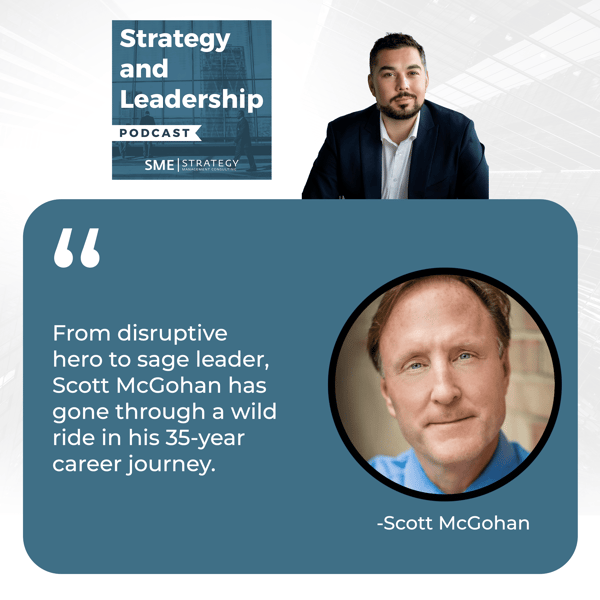
I started off even before we had word processing. We didn't have computers. We had typewriters and my best friend was White Out. I’ve gone all the way from there to these crazy things we carry in our pockets every day. I was involved in marketing early on. I moved into sales. Many years ago, my assistant came into my office and said, “You have values painted on the wall. You don't exhibit one of them. I have my own set of values. You taught that every day. Today’s my last day.” It was a big wake-up call in regards to who I was. Honestly, I was very good at sales. I was a chameleon. I had a mask for work, a mask for home, a mask for church, and a mask for a golf course.
Now, I was a lost little kid who tried to fill his life full of cars, homes, stuff, and sales and was successful. I made a deal with her that I would hire a coach and we had access to that coach together and we would ask each other three questions every day, “Am I okay? Are you okay? Are we okay?” That gave me the chance to look at the gift of self-awareness, the gift of emotional intelligence.
Honestly, now I can look back and say that the mirror is a wonderful place to find a friend. If you're not kind to yourself, it's hard to be kind to others. You can't encourage yourself or others. By the grace of God, she retired after 25 years of being here. I got to wheel her out on these big carts we have at McGohan Brabender. We call them victory carts. We wheel people around, ring a bell, and we celebrate. I got to wheel her to the front seat of her car for her last day of work here at MB. She was my truth-teller. She woke me up. She was brave enough to have that conversation.
The mirror is a wonderful place to find a friend. If you're not kind to yourself, it's hard to be kind to others.
It's so interesting. First of all, when you do your cart ceremony, let me know. If I get an invite, I'd love to come down. What I found interesting was that when we started this conversation, you talked about the tools. You're like, “Word processing and White Out,” and then looking and saying one of the things that was the big difference in terms of work performance was the walking the walk and the challenge of a person that you guys obviously had enough trust for that person to call you out on your BS.
You talked about your own personal ability to call yourself out. It's challenging for certain leaders who have this desire and need to not protect themselves, but you're in a position of power, you want to look good, and you want to look like you have it all together. Sometimes, you can be the kind of leader who is authoritative and blasting, and it's everybody else's problem.
One of the formative things that I heard was you had two people who told you what was what. You had this assistant that said, “You're not practicing what you preach.” You had yourself and you had to look and say, “Am I the kind of human being in my communities that I want to be?” It sounds like both of those things took you on a journey of self-reflection and growth. Do I have most of that correct?
Every organization has one of me in it. They're called destructive heroes. They're people who are very successful, probably good at sales, managing big accounts, or like a founder's kid, almost like an untouchable. I’ll tell your readers, too, that redemption and restoration are available, but they're costing your organization a ton of money more than you ever think.
If you add up all the time you spend talking about this individual, add up all the salaries involved in that conversation, and then add up all the people you had to zip in body bags because of that person, it's costing your organization a ton of money. The worst thing is, as business leaders, what you allow in your organization, you actually encourage, so you're actually encouraging that behavior, which is doubling down on dysfunction.
I got some folks I'm going to send that clip to in two seconds. Absolutely. People tend to only think of the upside of that person. What I was sharing to that exact point, it sounds like you are one of those people, but there's the multiplier. You see it as a one-to-one. It's like this person brings in a bunch of money, but they're hard to replace. What is the multiplier of the people left in body bags and the putting a lid on the people around?
What I hear is you are one of those people and you reflected on it, but then I also imagine that in your leadership, you were either on the lookout for those people or at least you're acutely aware of how to support them. Tell me, in your experience, I won't say how you deal with yourself, but how do you handle those conversations in an organization, especially when they're high performers?
Adults are a lot more like kids than we think. Most people often do what they see, not what they hear. I think everyone wants a good culture. The reason that I believe that culture is an inside job is because I believe it belongs on the inside of us. You can fake it until you make it or all of those things. If you don't know who you are, then you should probably buy and everyone you care about a helmet because life's going to get hard and fast.
As a leader, your job is to make sure that that behavior for the entity or the organization is alive and well. If it's not, you got to call that out. Do that with truth and grace at the same time because truth with no grace is mean and grace with no truth is meaningless. As a leader, how do you bring that to life in a compelling way to let other people know?
A new hire walks into a building, there are two questions they're going to ask themselves. It's not in your manual or your employee handbook. They're walking around and they're navigating. 1) “How do I get in trouble around here?” 2) “How do I get rewarded?” We don't tell them any of that, but they see it with their eyeballs and hear it with their ears. If that's wonky, then your culture is wonky.
It's interesting. When we do strategic planning sessions, we talk about values and scorecards. We talk about the goals. That is the explicit way of saying like, “Here's the manual. Here's how you get rewarded. Here's how you stay out of trouble.” Even if you do have that, there's still stuff that people catch. It's the stuff on the shop floor. It's those side conversations. It's the people being mean to each other. That's the behavior that you're watching in practice versus on paper. I wanted to get that on the t-shirt, the truth and grace.
I assert that both truth and grace are tools that you learn to wield to use effectively. Some people can drop truth bombs, but they're just being jerks, and some people are Minnesota nice and don't actually move anything forward. I look at that and I say, “How does a leader develop that?” I also want to parallel that or combine that with the idea of vulnerability. You've been extremely vulnerable in this show. You're very truthful in saying where you're at. We talked about new leaders’ potential aversion to vulnerability. How does being vulnerable and understanding oneself coincide with the ability to use truth and grace effectively within an organization in your eyes?
Outside of curiosity, vulnerability might be the second greatest gift that we have inside of organizations. I had an employee come up to me one time. She said, “You're way too vulnerable. It makes you look weak.” I said, “That's actually the weakest thing I’ve ever heard.” They said, “I don't understand.” I said, “I didn't think you would.” They said, “Will you explain it to me?” I'm like, “Not today. Maybe tomorrow. I'm going to let you sit in that little mess.” Here's what I know because I know who I was. I was a lost, tired, lonely, broken, scared little boy who I thought self-worth equaled performance plus the opinions of others. In other words, your opinion of me meant more than my own opinion of myself.
Outside of curiosity, vulnerability might be the second greatest gift that we have inside of organizations.
When I got to restore who I was, I became self-aware in regard to my relationship with myself. I got to take my past and open that up. Now, I can use my past not to torture myself but to be useful to other people. I'm getting the answer to your question because this is what I know. Inside an organization, everybody comes to work with miscarriage, financial fear, bad marriages, kids getting bullied at school, and taking care of elderly parents.
Some employers think that people leave that at home. They don't leave it at home. It shows up in our pockets. It shows up in our facial expressions. When we're vulnerable and let other people know where we've struggled in our lives, it lets other people know they're not alone. Who knows? I heard a long time ago that life's a wonderful teacher and she rarely gets an apple on her desk.
When you're vulnerable, you can hand apples to people, and maybe by the grace of God, they don't have to take a bite out of it. I'm old. I’ve made a ton of mistakes, but I'm also proud of many things in my career. However, I do know this. I'm more useful when I can share where I made my mistakes versus my successes in life. It's a great gift. If there are people that are afraid of it, then you should probably look inside yourself because you're probably afraid.
There's a great guest that I had, Darryl Stickel, who talks about trust. Trust is like when you give space to somebody else and watch it because I can't even capture half the things he said. It was so golden. One of the things from you is don't take your past and put it into your future in terms of relationships. I like that. That person's perspective on vulnerability was more of a reflection of them than it is of you. Their perspective of you is not going to impact your perspective of yourself.
Dion Sanders had a good media quote about that. There was one other piece of it. COVID or during the COVID times, that shone a light on people's balance of personal and work because you had their personal before they put this filter on and before people knew what was going on. They had their messy bedrooms, there were kids running around, and they were exhausted. That was life. The benefit of that new work-from-home showed the humanity.
Corporate America generally might not want the reality of what is humanity to show up in our work. I also believe going from boardroom to boardroom that you can't unsee that. It sounds like one of the core principles of how you operate is that the humanity is you are the human in your work, not the other way around.
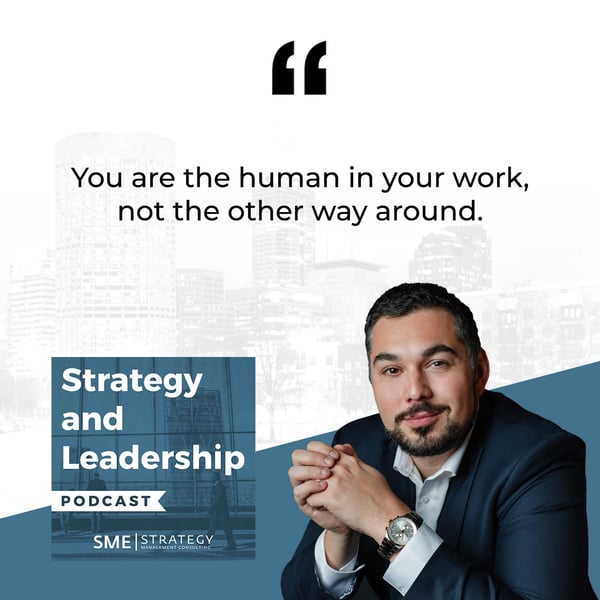
You've got the book, Culture Is an Inside Job. You've got the tail end of your career, at least for now, until you decide to do what you do. What is your list of priorities now? What are some of the things that you're challenging yourself with? What do you want to take on over the next little while that you're looking forward to?
For me, one is my wife's followed me for a third of my life. It's like, “What do you want to do? I’ll follow you.” Outside of ballroom dancing, I'm probably in. I’ve got a deep passion for mental health and substance abuse, and those people who struggle and who are lonely, tired, broken, and afraid. Where can I be useful and helpful to that population? Outside of that, I like golf, but shoot me now, I'm not going to play golf every day. This world does not end well with me having nothing to do. It's unsafe for humanity.
You are a disruptive hero. We got to make sure that we put that energy in the right place. That's exciting. As we finish up here, let’s say we got a new leader reading this for the first time and they're saying, “This guy has been in a company for so long. He's climbed the corporate ladder. He's done all that stuff.” What are 2 or 3 lesson that you learned or pieces of advice that you would give to that new leader to help them be as successful in their role but also successful as a human being? As somebody with years of marriage, also, congratulations on that. What are the pieces of advice that you would give to that person now and then we'll finish up?
Probably engulf yourself in anything in regard to emotional intelligence. Read. Listen to podcasts. Listen to books. I don't think AI can't fix that. Body language, tone, nonverbal communication, empathy, and all of those things, when you build that skillset, it's transferable everywhere. Most importantly, for young people, lead until someone tells you not to. No one's going to tell you not to. Everybody wants to be led, but you can't lead people farther than you've led yourself.
You can't lead people farther than you've led yourself.
If you work on yourself and you're vulnerable and you got the courage to stand up and make a call, other people want to follow you. Great leaders create followers, not fans. If you're doing it for applause, buy a helmet because you're going to get hit hard. If you're doing it for the right reasons and for the right motives, the world's yours, so have fun.
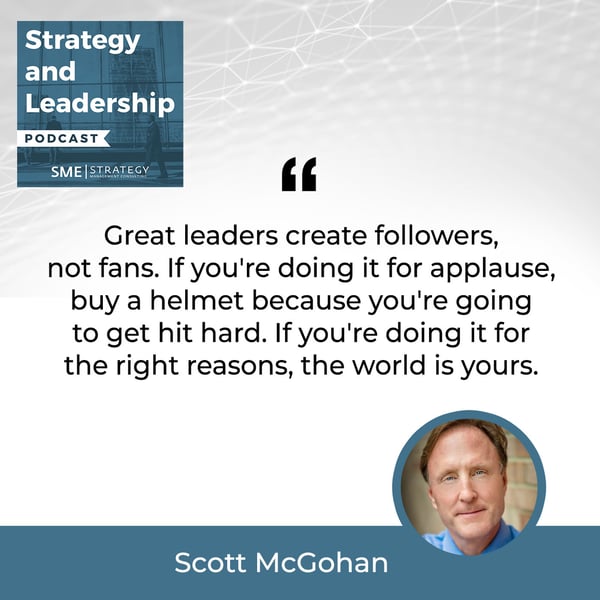
A bonus fourth one is to buy a helmet no matter what because, one way or the other, you're going to take some bumps and take some lessons and learn. That was appreciated. Scott, where can people get your book? Where can they connect with you? Where can they and if they represent an organization that's doing great with substance abuse, either in the Ohio or greater area? Where can they connect with you?
On LinkedIn, Scott McGohan, and Instagram. The book's on Amazon. You can go there. My email address is ScottMcGohan@Gmail.com.
Transparency, that's how you get people. Scott, thank you for chatting with me. Thanks for sharing your life. Congratulations on an amazing life and career in that order. I wish you nothing but the best move forward. Congrats on the book. It sounds like an awesome thing and a life's work well written. Good job.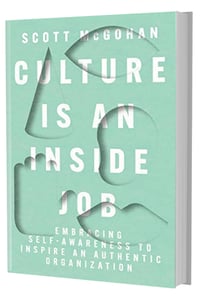
Thank you very much. Thanks for having me and thanks for everything you do too.
My pleasure. Thank you, sir. Folks, my guest, Scott McGohan. One of the things that I take away from that is A) You can't lead people further than how you lead yourself. B) Watching out for those disruptive heroes and recognizing that there is a cost there and it's cumulative. There's no downside to transparency. If you're afraid of it, it might, but it opens up the upside of it. It creates unimaginable positivity.
You don't know what's behind that door until you open it. It takes a lot of risk and it takes a lot of heart to get there. Check him out, connect with him, and get his book Culture Is an Inside Job. Scott, I appreciate you being here. Thanks for the time. Folks, thanks for reading. Thanks for subscribing. Thanks for sharing. Thanks for doing whatever you do and I’ll see you next time.
PS: If you're looking for strategic planning services visit SME Strategy.net
Important Links
- McGohan Brabender
- Culture Is an Inside Job
- Darryl Stickel – Past Episode
- Scott McGohan – LinkedIn
- Instagram – Scott McGohan
- ScottMcGohan@Gmail.com
About Scott McGohan

Scott McGohan leverages his decades of leadership and business experience to improve workplaces.


